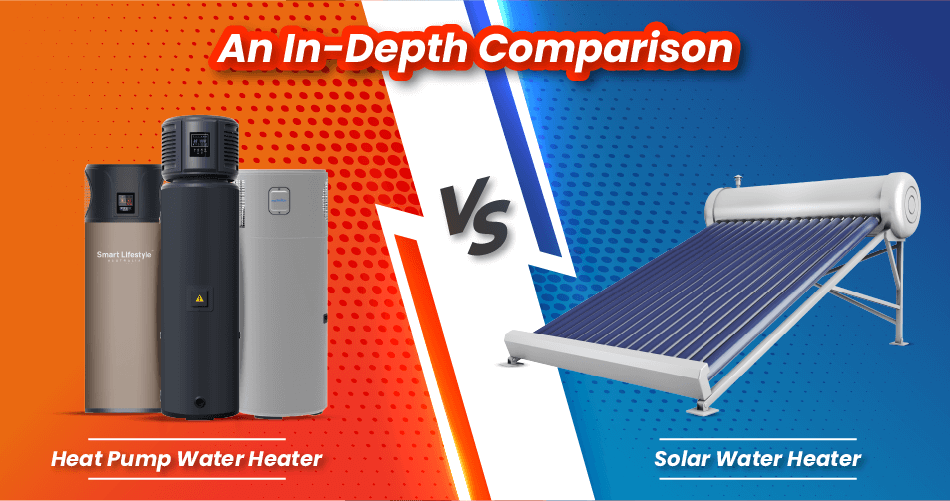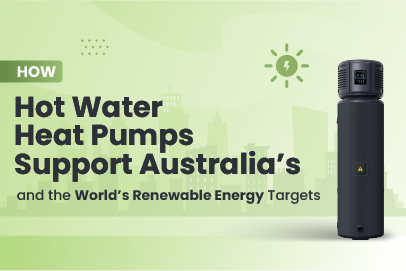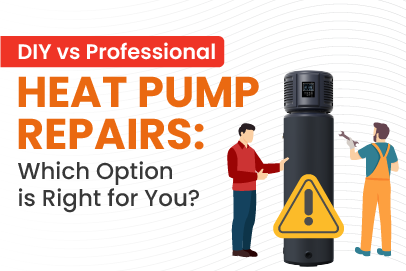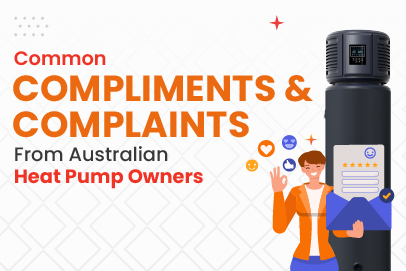As homeowners become more environmentally conscious, the demand for efficient and eco-friendly water heating solutions has surged. Among the most popular options are heat pump water heater vs solar water heater. Both systems offer significant advantages, but they also come with their own set of challenges. In this article, we will compare these two systems in detail.
Heat Pump Water Heater vs. Solar Water Heater
When comparing heat pump water heaters and solar water heaters, several key factors come into play, including energy efficiency, cost, maintenance, and overall performance.
Energy Efficiency
Heat pump water heaters are known for their high energy efficiency. They work by extracting heat from the air and transferring it to the water, making them about three times more efficient than traditional electric water heaters.
This process requires less electricity, resulting in lower energy bills. On the other hand, solar water heaters rely on solar panels to collect and convert sunlight into thermal energy, which is then used to heat water.
While solar energy is free, the efficiency of solar water heaters can be affected by weather conditions and geographic location.
Cost
The initial cost of a solar hot water system is generally higher than that of a heat pump water heater. Installing solar panels and the necessary components can be expensive, and the return on investment may take several years.
In contrast, heat pump water heaters typically have a lower upfront cost and can start saving you money on energy bills almost immediately.
Maintenance
Maintenance is another crucial factor to consider between heat pump water heater vs solar water heater. Heat pump requires minimal maintenance, often limited to annual checks to ensure the system is running smoothly.
Solar water heaters, however, can encounter more common solar water heater problems, such as issues with the solar water heater not working, which may necessitate more frequent solar hot water repairs.
Additionally, the panels can become dirty or shaded, reducing efficiency and requiring regular cleaning and maintenance.
Performance and Reliability
Heat pumps can produce hot water consistently, regardless of the time of day or weather conditions. This makes them a reliable choice for year-round use.
Conversely, solar water heaters depend on sunlight and may struggle to generate sufficient hot water during cloudy or winter days, posing a significant disadvantage for those living in areas with less sunlight.
Disadvantages of Solar Hot Water Systems
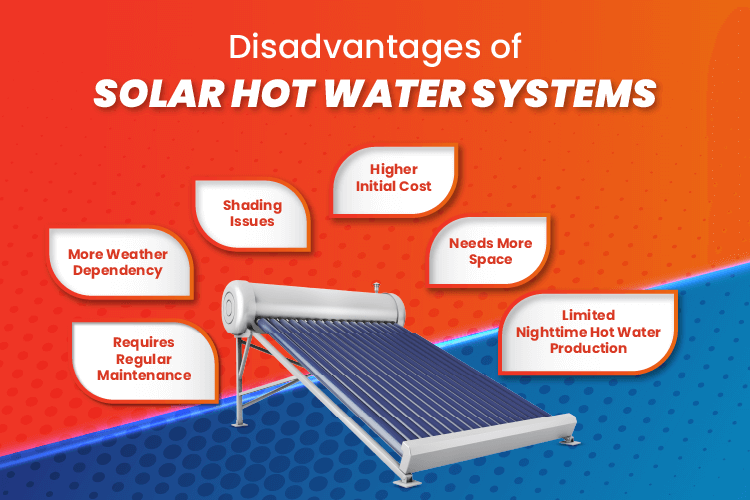
- Initial Cost: The initial cost of a solar hot water system is higher, making it a less attractive option for budget-conscious homeowners.
- Weather Dependency: Solar hot water systems can't collect enough solar energy to heat the water during winter or if it's cloudy, leading to inconsistent performance.
- Shading Issues: Any shading on the solar panels can significantly reduce their efficiency, requiring careful placement and potential removal of obstacles like trees.
- Maintenance: Compared to heat pumps, solar water heaters require more maintenance. Regular cleaning and occasional repairs are necessary to keep the system running efficiently.
- Space Requirements: Solar water heaters require more space for the installation of panels, whereas heat pump systems typically have fewer space requirements.
- Limited Hot Water Production: Solar hot water systems generate hot water only during the day, while heat pumps can produce hot water 24/7, providing a more reliable supply.
The Versatility of the Heat Pump
Additionally, the versatility of heat pump water heaters can cater to diverse household needs.
While solar water heaters depend on optimal sunlight conditions, heat pump systems remain effective regardless of weather, ensuring a consistent supply of hot water throughout the year. This reliability is especially critical in regions with less predictable weather patterns.
Furthermore, heat pump systems are generally quieter and more compact, making them suitable for homes with limited space.
By providing a dependable and efficient solution, heat pump water heaters can significantly enhance household comfort and energy savings.

Conclusion
When it comes to choosing between a heat pump water heater and a solar water heater, it's essential to consider your specific needs, location, and budget. While solar water heaters can offer significant energy savings and environmental benefits, they come with higher initial costs and greater dependency on weather conditions.
Common problems with solar hot water systems, such as shading and maintenance requirements, can also pose challenges.
On the other hand, heat pump water heaters provide a consistent and reliable source of hot water, with lower initial costs and minimal maintenance requirements. Their ability to produce hot water 24/7, regardless of weather conditions, makes them an attractive option for many homeowners.
For those looking to maximize energy efficiency and reduce their environmental footprint, combining both systems could be the ideal solution.
By using solar energy to power a heat pump, homeowners can enjoy the benefits of both technologies while minimizing their reliance on traditional energy sources.
Ultimately, the choice between a heat pump water heater and a solar water heater will depend on your individual circumstances.
By carefully evaluating the advantages and disadvantages of each system, you can make an informed decision that best meets your needs and helps you achieve your energy efficiency goals.
A heat pump water heater uses electricity to transfer heat from the air to the water, while a solar hot water system uses solar panels to convert sunlight into thermal energy to heat water.
Yes, you can run a heat pump water heater on solar power by using a solar photovoltaic (PV) system to generate electricity, which then powers the heat pump.
Heat pumps require minimal maintenance, typically limited to annual checks to ensure the system is operating efficiently.
Solar water heaters can work in the winter, but their efficiency may be reduced due to shorter daylight hours and less intense sunlight.
Solar hot water systems can be worth it if you live in an area with abundant sunlight and are committed to regular maintenance. However, the high initial cost and weather dependency can be drawbacks.

